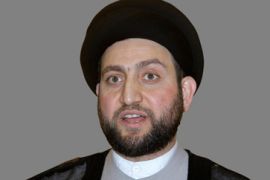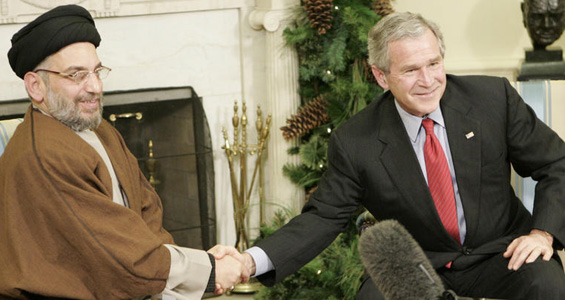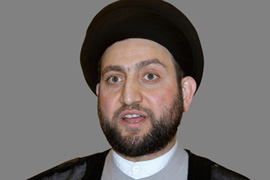Profile: Ammar al-Hakim
The Shia cleric inherited the helms of a powerful organisation after his father died.

 |
| Abdulaziz al-Hakim enjoyed support from the Bush administration, despite the Shia cleric’s ties with Tehran. Ammar al-Hakim assumed leadership of the ISCI after Abdulaziz died in 2009. [AP] |
Ammar al-Hakim, a junior Shia cleric, leads one of Iraq’s most influential Shia groupings, The Islamic Supreme Council Iraq (ISCI). ISCI is running in in the March 7 parliamentary as the biggest party in the Shia coalition, Iraqi National Alliance.
Formerly known as the Supreme Council for the Islamic Revolution in Iraq (SCIRI), the once exiled Shia Islamist group changed its name to the Islamic Supreme Council of Iraq in 2006. In September 2009, Abdulaziz al-Haikim, its co-founder and spiritual leader since 1982, died of cancer passing the leadership on to his son Ammar.
The ISCI commands the loyalty of the most powerful Shia militia in Iraq today – the Badr organisation (formerly known as the Badr Brigade).
Ammar al-Hakim was born in Najaf, south of Baghdad, in 1971. By the late 1970s, the Iraqi government under Ahmed Hassan al-Bakir began to clamp down on political dissent targeting Shia clerics who openly spoke against Baathist rule. When several of his relatives were reported to have been executed for subterfuge against Baghdad, Ammar and his father fled to Iran.
He continued his education in Islamic jurisprudence, following in the tradition of the Hakim family for generations.
Iranian support
In 1982, his father and uncle – Mohammed Baqir al-Hakim – began to organise Shia opposition to Saddam Hussein’s government and openly sided with Iran in its eight-year war with Iraq. The Badr Brigade began to help Iranian forces on the battlefield and participated in the interrogation of Iraqi prisoners of war.
In 1991, following Iraq’s overwhelming defeat in and retreat from Kuwait, SCIRI helped to organise an armed revolt in southern Iraq.
The Hakim family would not return to Iraq until after April 9, 2003, when US forces entered Baghdad and Saddam Hussein fled north to Tikrit.
Shortly after, Abdulaziz al-Hakim was appointed to the interim Iraq Governing Council by Coalition Provisional Authority chief Paul Bremer.
When Baqir al-Hakim was assassinated on August 29, 2003, the leadership passed on to Abdulaziz.
Powerful Shia bloc
 |
| Ammar al-Hakim took control of ISCI after his father died of cancer in September 2009 [AP] |
SCIRI then formed a powerful coalition of Shia groups, the United Iraqi Alliance (UIA), which comprised other parties such as the Islamic Dawa Party and the populist Sadr movement. The UIA won a majority of seats in the 2005 parliamentary elections, thanks largely to a Sunni boycott of the Iraqi political process.
However, as Sunni Arabs slowly began to re-integrate into domestic politics, the Shia religious parties began to lose influence. In the January 2009 provincial elections, SCIRI, now re-named ISCI, lost many votes.
A few weeks later, ISCI split from the UIA, which fragmented into two main blocs – the Iraqi National Alliance, led by al-Hakim and the Sadr movement, and the State of Law coalition, led by Nouri al-Maliki, the prime minister.